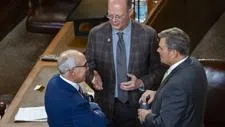The Nebraska Legislature has taken a major step toward reducing the state’s projected budget deficit by passing two key bills Wednesday morning—though a sizable gap still remains. Lawmakers approved Legislative Bill six hundred fifty by a vote of forty to seven, and Legislative Bill six hundred forty-five by a vote of forty-five to two. The first bill will scale back or eliminate several tax incentives, including Nebraska’s biodiesel tax credit and credits for food bank donations. The second measure adjusts the contribution rates to the Statewide School Retirement Plan, impacting teachers, school districts, and the state.
Both bills, introduced at the request of Governor Jim Pillen, now head to his desk and are expected to be signed into law. Initially, the pair of bills was expected to fully cover a one hundred twenty-four million dollar deficit, with the Legislative Fiscal Office estimating a one hundred thirty-three million dollar revenue gain over two fiscal years. However, a recent economic forecast raised the projected deficit to three hundred ninety-six million dollars, leaving lawmakers with a two hundred sixty-three million dollar gap to address before May fifteenth.
The bills passed without debate on Wednesday, though earlier rounds saw pushback. State Senator Danielle Conrad of Lincoln criticized the measures, calling them a tax increase and arguing that they were rushed through the process. She also expressed concern that the changes could impact teachers, despite support from the Nebraska State Education Association.
Under the retirement plan reform, teacher contribution rates—currently at nine point seven eight percent of annual salary—could drop to seven point two five percent if the plan reaches full funding, which would effectively increase take-home pay by over one thousand dollars annually. Should the plan’s funding dip below ninety-six percent, contributions would return to nine point seven five percent. The teachers union supports the bill, saying it would boost recruitment and retention efforts amid statewide staffing shortages.


















Comments